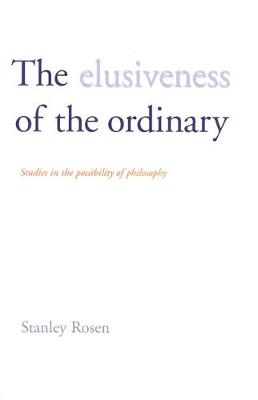The concept of the ordinary, along with such cognates as everyday life, ordinary language and ordinary experience, has come into special prominence in late-modern philosophy. Thinkers have employed two opposing yet related responses to the notion of the ordinary: scientific and phenomenological approaches on the one hand, and on the other, more informal or even anti-scientific procedures. Philosopher Stanley Rosen here presents a comprehensive study of the main approaches to theoretical mastery of ordinary experience. He evaluates the responses of a wide range of modern and contemporary thinkers and grapples with the peculiar problem of the ordinary - how to define it in its own terms without transforming it into a technical - and so, extraordinary - artefact. Rosen's approach is both historical and philosophical.
He offers Montesquieu and Husserl as examples of the scientific approach to ordinary experience; contrasts Kant and Heidegger with Aristotle to illustrate the transcendental approach and its main alternatives; discusses attempts by Wittgenstein and Strauss to return to the pre-theoretical domain; and analyzes the differences among such thinkers as Moore, Austin, Grice and Russell with respect to the analytical response to ordinary language. Rosen concludes with a theoretical exploration of the central problem of how to capture the elusive ordinary intact.
- ISBN10 0300129521
- ISBN13 9780300129526
- Publish Date 1 August 2002 (first published 11 July 2002)
- Publish Status Active
- Publish Country US
- Imprint Yale University Press
- Format eBook
- Pages 336
- Language English
